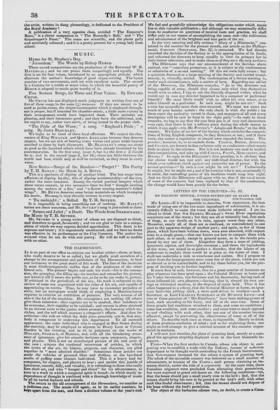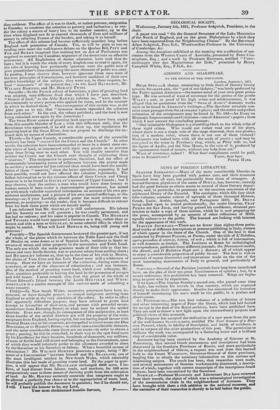LETTERS ON THE COLONIES—No. HI.
TO VISCOUNT HOWICK, UNDER-SECRETARY OF STATE FOR
THE COLONIES. 27th December, 1830. MY LORD—If it be impossible to describe, from experience, the best mode of using one of the two main ingredients of colonization, it is extremely difficult to name the worst mode hitherto adopted. I am in clined to think that SIR GEORGE MunnAy's Swan River regulations constitute one of the worst ; but they are all so miserably bad, that each of them, as one dwells on it in turn, appears worse than any other. Moreover, nearly all of them are so confused, so contradictory in one part to the apparent design of another part ; and again, so few of thoseplans, which have been written down, were ever executed, with respect even to a single grant,--that one knows not how to compare them with each other, or to speak. except in general terms as to the results pro.. duced by any one of them. Altogether they terms, a mass of jobbing, ignorance, caprice, and downright nonsense ; and these, the ingredients of the mass, are mixed in so perfect a disorder, that the labour of an endeavour to explain them would be as great as the waste of time. I shall not undertake a task so wearisome and useless. But I propose to select from the heterogeneous mass some few of the plans, which are not so absurd as to be indescribable, and to lay these before you, for the pur. pose of inviting you to further inquiries.
It must first be said, however, that in a great number of instances no
plan whatever has been acted upon ; the Colonial Minister at home and his Under Secretaries, the Governor and his Secretaries, having each of them followed his own pleasure,—having, that is, obeyed his own corrupt or whimsical motives, in the disposal of waste land. Thus it has often happened in a colony, that the Colonial Minister at home, an ignorant lord—his jobbing clerk, a mere quill-driver in intellect—such a Governor as Lord CHARLES SOMERSET or Sir HUDSON LOWE—and two or three parasites of "His Excellency," have been making grants of land, each according to his fancy, and all at the same time. Some of these grants had conditions attached to them, and some no conditions ; some one condition, and some another ; and some were so much opposed to and clashing with each other, that not one of the number became effective, except by preventing the effectiveness of some or all of the others. To describe such cases as these, is impossible. Merely to think of them produces confusion of mind ; and as for explaining them, one might as well attempt to give a. rational account of the conceits engendered in madness.
I will now just mention five plans of granting land, merely as a sample of the egregious stupidity displayed even in the least blameable instances.
First—When the first settlers in Canada, whose sole object in emigrating was to establish a trade with the Indians, became of sufficient importance to be thought worth controlling by the French Government,
that Government invented for the colony a system of granting land. The whole of the accessible country was bestowed on a small number of adventurers, as tenants of the Crown ; each person obtaining an immense district, under the title of a seigneurie. At the same time, these Canadian seigneurs were precluded from alienating their possessions, but were enjoined to grant sub-leases on the following conditions—lst, that the lessee should pay a small yearly sum to the lord ; 2nd, that the tenant Should bring his corn to be ground at the lord's mill, with other such like feudal observances ; 3rd, that the tenant should not dispose of his lease without the lord's permission. The object of this barbarous scheme was, no doubt, to create a Cana. dian noblesse. The effect of it was to check, or rather prevent, emigration to Canada ; to condemn the colonists to poverty and barbarism ; to render the colony a source of heavy loss to its mother country, up to the time when England saw fit to expend thousands of lives and millions of money in relieving France of the burden, and taking it to herself. The effect of this scheme had become sufficiently manifest long before England took possession of Canada. Yet, as will be plain to you on reading once more the well-known debate on the Quebec Bill, PITT and Fox and BuRKE imagined that nothing but an Act of Parliament was required to convert the Canadian seigneurs of the desert into an effective aristocracy. All Englishmen of decent education have read that debate ; but it is worth the while of every Englishman to read it again, for the sake of learning how profoundly ignorant were the public men of your grandfather's time concerning the mere elements of public eco.somy. In passing, I may observe that, however ignorant those men were of the true principles of Colonization, and however confident of their own perfect knowledge a the subject, they were not, in these respects, behind " statesmen " of the present day,—to wit, Lord Baruunsr, Mr. WILMOT HORTON, and Mr. Honacc Twiss.
Secondly—In the French colony of Louisiana, a plan of granting land was adopted, very different from that which I have just described. "Grants of land," as the Abbe RAYNAL informs us, "were made indiscriminately to every person who applied for them, and in the manner in which he desired them." One consequence of this system was, as the Abbe goes on to say, that "immense deserts separated the colonists from each other." In the end, the colony perished ; and the land is now being colonized over again by the Americans ! The Swan River system of granting land appears to have been copied from this notable blunder of LAW ; with this difference only, that the Scotchman who approved, if he did not draw up, the regulations for granting land at the Swan River, does not propose to discharge the national debt by means of colonization. Thirdly—In Upper Canada, a considerable portion of the accessible territory has been "reserved for the Crown and the Church." In other words, the colonists have been commanded to leave in a desert state certain tracts of land, so intermixed with their own grants as to prevent them from living near to each other. Yost will readily conceive that neither the Crown nor the Church ever thought of cultivating those "reserves." The malpractice in question, therefore, had the effect of permanently interposing tracts of wilderness between the grants made to settlers ; a measure far less rational than would have been the annihilation of those "reserves," since the latter operation, supposing it had been possible, would not have affected the colonists injuriously. The fullest information as to the ruinous effects of these Crown and Clergy reserves is to be found in Gount-ty's account of Upper Canada; but I may observe, that the author, a man who would have done honour to human nature if born under a representative government, has mixed up with much valuable statistical information an account of his own preeminent misfortunes, and a picture of his own mental sufferings, so distressing—or, if your Lordship should prefer the more aristocratic expression, so annoying—to the reader, that it becomes difficult to extract from his book those parts which are merely useful. I am informed that Mr. GOURLAY is still unfortunate. His talents and his honesty no one will question ; he was cruelly persecuted, and has had no redress ; and his name is popular in Canada. The Munnavs and MISSES would have appointed a footman or a dog, rather than so honest and able a man as GOURLAY, to some colonial Office in which he might be useful. What will Lord Howie's do, being still young and generous ? Fourthly—The Spanish Government bestowed the greater part, if not the whole, of the plains which lie between the Table Land and the Gulf of Mexico on some dozen or so of Spanish lords, residents in Spain or owners of mines and other property in the mountains and Table Land. The only use which the noble grantees made of their title to that immense and very fertile district, was to prevent others from settling there ; and HustnoLnr informs us, that up to the time of his visit to Mexico, the plains of Vera Cruz and San Luis Potosi were still a wilderness of swamp. Here we have an instance of the extinction, during snore than a century, of one of the elements of colonization ; and one instance, also, of the method of granting waste land, which your colleague, Mr. RAY, considers preferable to leaving the land in the possession of savages and wild beasts. I must remark also, that the grant of the whole of Prince Edward's Island between the Lords MELVILLE and WESTzronELAND is a similar example Of this curious mode of colonizing a waste country.
Fifthly—In New South Wales, successive governors have been in structed, or have thought proper, to compel emigrants arriving from England to settle at the very outskirts of the colony. In order to effect this apparently ridiculous purpose, they have refused to grant land (except to favourites of their own, and persons with powerful recommendations from Downing Street) in what may be termed the settled districts. Even now, though, in consequence of this malpractice, at least three fourths of the settled districts are still the property of the state, emigrants from England, having capital, but not having found favour with
General DARLING-or his creatures, are compelled to travel across the Blue Mountains, or to Hunter's River,—in either case a considerable distance, and the more considerable since there are no roads—in order to obtain a grant; passing, let this be remarked, in their way to the spot fixed upon by his Excellency for their location, hundreds of thousands, nay millions, of acres of fertile land still desert and belonging to the Government, some of which they would infinitely prefer to the allotment awarded to them by the-Governor or his Secretary at Sidney. What a beautiful system of Colonization ! Mr. WILMOT HORTON possesses a paper, being "Minutes of a Conversation" between himself and Mr. BLAXLAND, one of the most intelligent settlers in New South Wales, which admirably illustrates this last mode of granting waste land. By the paper in question, it will appear that Mr. ELAN:LAND exchanged 4000 acres, I believe, of land distant from labour, roads, and markets, for 500 acres comparativeiy near to those means of deriving profit from the cultivation of land. As Mr. HORTON earnestly contends that emigrants ought to be allowed a perfectly free choice as to the appropriation of waste land, he will probably publish the document in question.; but if he should not, I:wilL I have the honour te be, my Lord,
Your moat .thettientand humble Servant,



























 Previous page
Previous page